Related Research Articles

The Evangelical Church in Germany, also known as the Protestant Church in Germany, is a federation of twenty Lutheran, Reformed, and United Protestant regional Churches in Germany, collectively encompassing the vast majority of the country's Protestants. In 2022, the EKD had a membership of 19,153,000 members, or 22.7% of the German population. It constitutes one of the largest Protestant bodies in the world. Church offices managing the federation are located in Herrenhausen, Hanover, Lower Saxony. Many of its members consider themselves Lutherans.
The North Elbian Evangelical Lutheran Church was a Lutheran regional church in Northern Germany which emerged from a merger of four churches in 1977 and merged with two more churches in 2012. The NEK largely covered the area of the states of Schleswig-Holstein and Hamburg where it was the most important Christian denomination. It had 2.1 million members in 595 parishes, constituting 46% of the population in its ambit.
The Evangelical Lutheran Church in Thuringia was a Lutheran member church of the umbrella Protestant Church in Germany. The seat of the church was in Eisenach. The church covered those parts of the state of Thuringia that were not part of the former Province of Saxony. It was the largest Protestant denomination in this area.
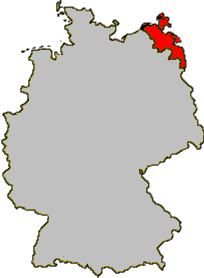
The Pomeranian Evangelical Church was a Protestant regional church in the German state of Mecklenburg-Vorpommern, serving the citizens living in Hither Pomerania. The Pomeranian Evangelical Church was based on the teachings brought forward by Martin Luther and other Reformators during the Reformation. It combined Lutheran and Reformed traditions. The seat of the church was Greifswald, the bishop's preaching venue was the former Collegiate Church of St. Nicholas in Greifswald.

The Independent Evangelical-Lutheran Church is a confessional Lutheran church body of Germany. It is a member of the European Lutheran Conference and of the International Lutheran Council (ILC). The SELK has about 33,000 members in 174 congregations. The seat of SELK is in Hanover.

The Prussian Union of Churches was a major Protestant church body which emerged in 1817 from a series of decrees by Frederick William III of Prussia that united both Lutheran and Reformed denominations in Prussia. Although not the first of its kind, the Prussian Union was the first to occur in a major German state.
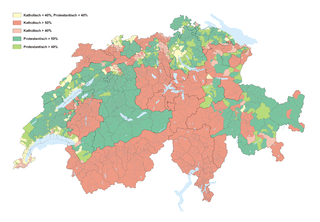
The Reformed branch of Protestantism in Switzerland was started in Zürich by Huldrych Zwingli and spread within a few years to Basel, Bern, St. Gallen,(Joachim Vadian), to cities in southern Germany and via Alsace to France.

The Evangelical-Lutheran Church of Hanover is a Lutheran church body (Landeskirche) in the northern German state of Lower Saxony and the city of Bremerhaven covering the territory of the former Kingdom of Hanover.

The Evangelical Lutheran Church in Oldenburg is a Lutheran church in the German state of Lower Saxony.
The Evangelical Church Berlin-Brandenburg-Silesian Upper Lusatia is a United Protestant church body in the German states of Brandenburg, Berlin and a part of Saxony.

The Evangelical Lutheran Church in Brunswick is a Lutheran church in the German states of Lower Saxony and Saxony-Anhalt.

Evangelical Church of the Palatinate is a United Protestant church in parts of the German states of Rhineland-Palatinate and Saarland, endorsing both Lutheran and Calvinist orientations.
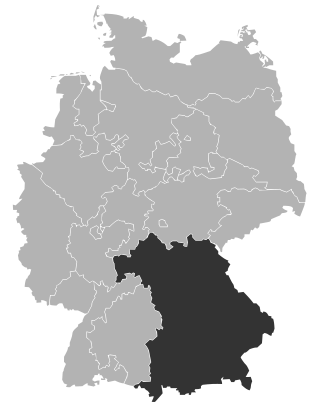
The Evangelical Lutheran Church in Bavaria is a Lutheran member church of the Protestant Church in Germany in the German state of Bavaria.
Lutheran viewpoints concerning homosexuality are diverse because there is no one worldwide body which represents all Lutherans. The Lutheran World Federation, a worldwide 'communion of churches' and the largest global body of Lutherans, contains member churches on both sides of the issue. However, other Lutherans, including the Confessional Evangelical Lutheran Conference and International Lutheran Council, completely reject homosexuality.
In Germany and Switzerland, a Landeskirche is the church of a region. The term usually refers to Protestant churches, but—in case of Switzerland—also Roman Catholic dioceses. They originated as the national churches of the independent states, States of Germany (Länder) or Cantons of Switzerland , that later unified to form modern Germany or modern Switzerland, respectively.
Buß- und Bettag was a public holiday in Germany, and is still a public holiday in Saxony. In Germany, Protestant church bodies of Lutheran, Reformed (Calvinist) and United denominations celebrate a day of repentance and prayer. It is now celebrated on the penultimate Wednesday before the beginning of the Protestant liturgical year on the first Sunday of Advent; in other words, it is the Wednesday that falls between 16 and 22 November. However, it is not a statutory non-working holiday any more, except in the Free State of Saxony. In the Free State of Bavaria, it is a school holiday only.

The Evangelical-Lutheran Church of Saxony is one of 20 member Churches of the Protestant Church in Germany (EKD), covering most of the state of Saxony. Its headquarters are in Dresden, and the seat of the bishop is at Meissen Cathedral. Prior to the propagation of state atheism in the German Democratic Republic, it was the largest Evangelical Lutheran church in Germany.

The Protestant Church of Anhalt is a United Protestant member church of the Protestant Church in Germany. Its seat is in Dessau-Roßlau in Saxony-Anhalt, in the former duchy of Anhalt. This church is the smallest regional church in Germany in terms of membership.
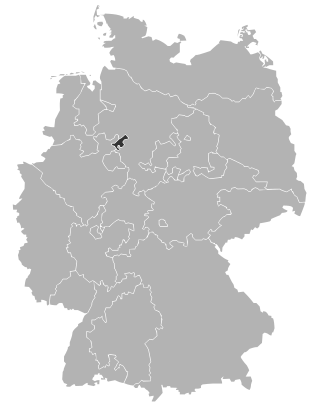
The Evangelical Lutheran Church of Schaumburg-Lippe is a Lutheran member church (Landeskirche) of the Protestant Church in Germany. It covers the former principality of Schaumburg-Lippe and seated in Bückeburg.
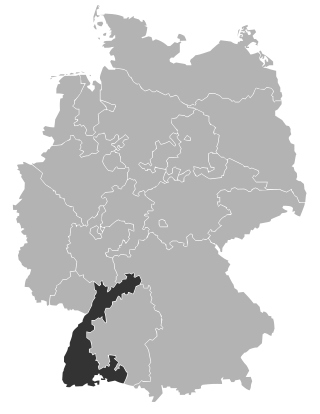
The Protestant Church in Baden is a United Protestant member church of the Protestant Church in Germany (EKD), and member of the Conference of Churches on the Rhine, which now functions as a regional group of the Community of Protestant Churches in Europe (CPCE). The Evangelical Church in Baden is a united Protestant church. Its headquarter, the Evangelical Superior Church Council is located in Karlsruhe.
References
- ↑ Brethren in adversity: Bishop George Bell, the Church of England p7 George Kennedy Allen Bell, Andrew Chandler - 1997 "In May 1922 a new German Evangelical Church Confederation, the Deutsche Evangelische Kirchenbund, was established with a Kirchentag, or assembly, of 210 representatives, a Kirchenbundesrat, or Church Confederation Council, ..."
- ↑ The correlation between political state (German: Land) and church region in the Weimar period was not necessarily exact, because regional churches mostly did not comply to territorial changes in the 19th century.
- ↑ The government in effect collected church fees from those taxpayers enlisted as parishioners and distributed these funds to the churches.
- ↑ Siegfried Hermle Handbuch der Deutschen Evangelischen Kirchen 1918 bis 1949 p15 - 2010 "Die Gründung des Kirchenbundes wurde vorbereitet durch eine Vorkonferenz in Kassel 1919 und die Deutschen Evangelischen Kirchentage in Dresden 1919 und Stuttgart 1921."
- 1 2 3 4 5 6 7 8 9 10 11 12 13 14 15 16 17 18 19 20 21 Sebastian Müller-Rolli in collaboration with Reiner Anselm, Evangelische Schulpolitik in Deutschland 1918–1958: Dokumente und Darstellung, Göttingen: Vandenhoeck & Ruprecht, 1999, (=Eine Veröffentlichung des Comenius-Instituts Münster), p. 30. ISBN 3-525-61362-8.
- 1 2 3 4 5 Sebastian Müller-Rolli in collaboration with Reiner Anselm, Evangelische Schulpolitik in Deutschland 1918–1958: Dokumente und Darstellung, Göttingen: Vandenhoeck & Ruprecht, 1999, (=Eine Veröffentlichung des Comenius-Instituts Münster), p. 29. ISBN 3-525-61362-8.